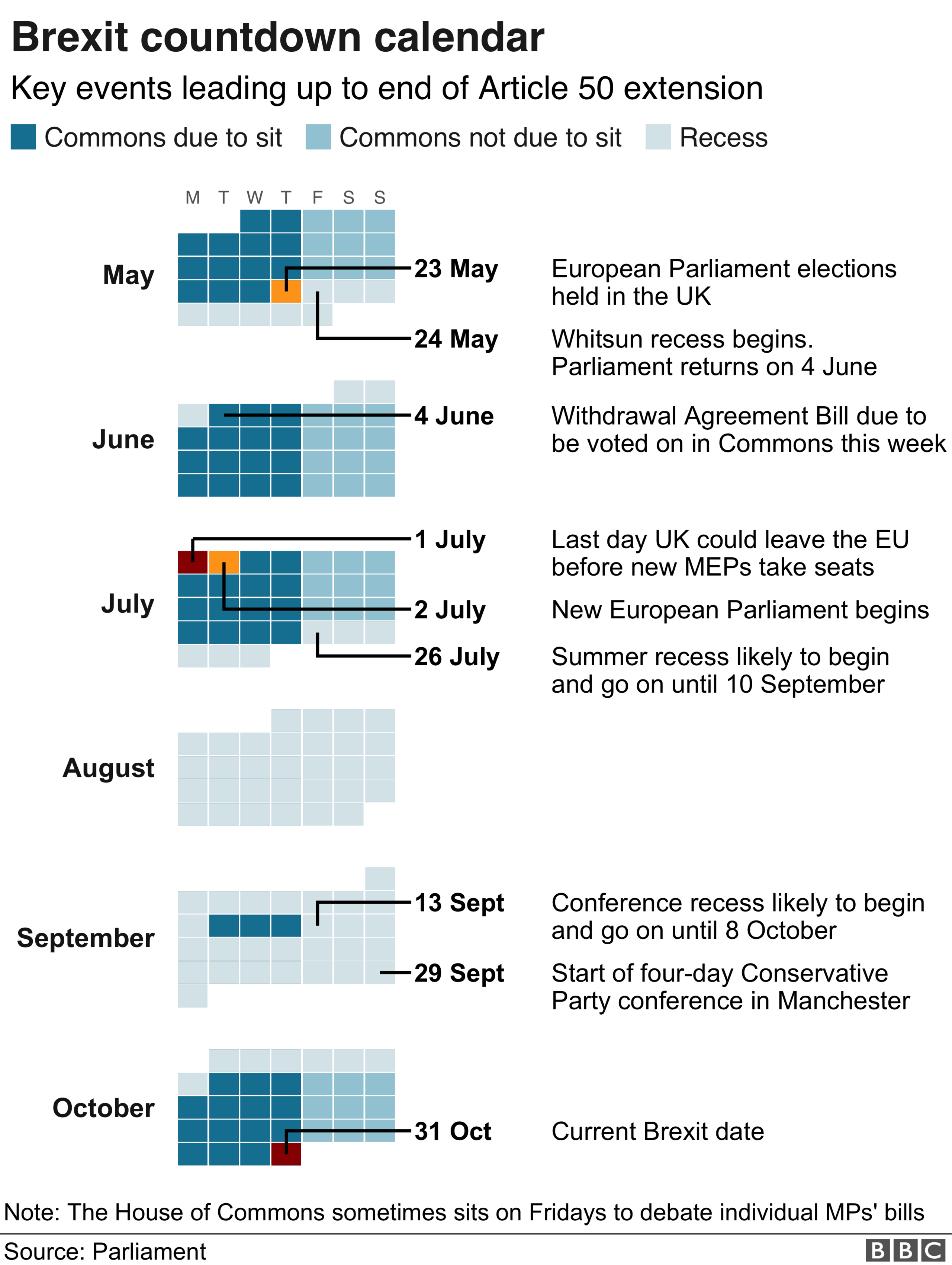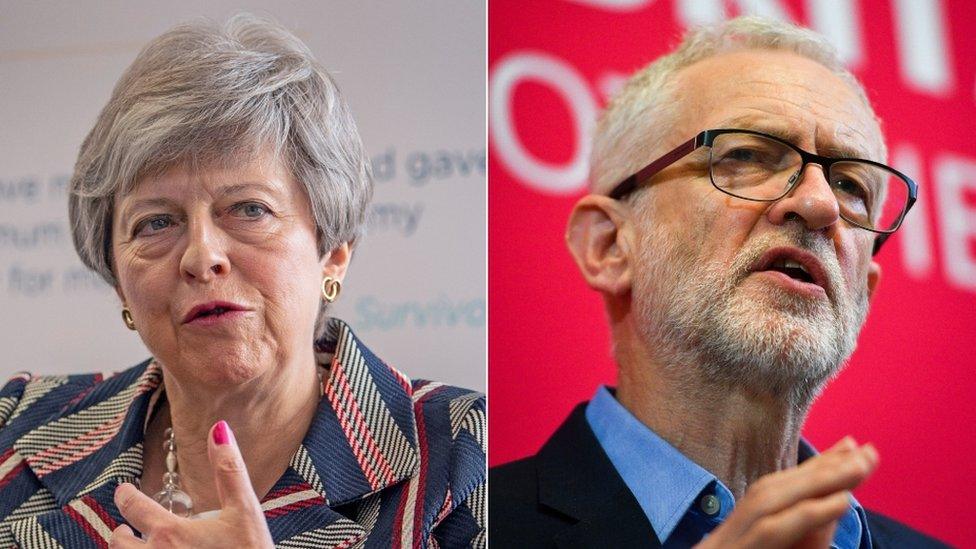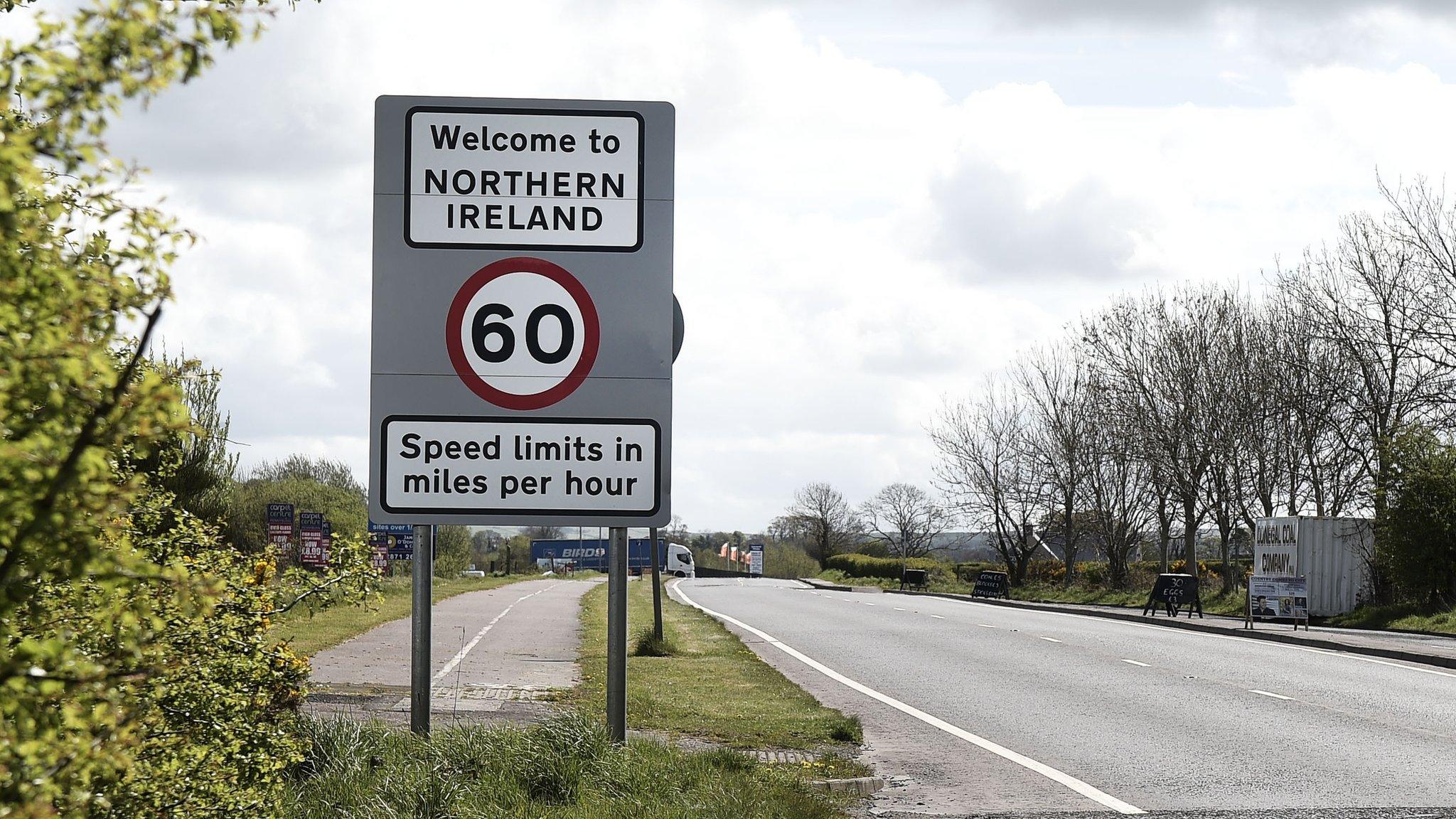Brexit: Theresa May says MPs 'have duty' to support bill
- Published
Theresa May: MPs "have a duty" to deliver Brexit
Theresa May says MPs have a "duty" to "ensure we deliver" Brexit by voting for the withdrawal bill in the Commons.
The government says the bill - required to implement the PM's deal - will be considered by MPs in the week beginning 3 June.
Earlier, Brexit Secretary Stephen Barclay said the deal would be "dead" if MPs did not pass it.
But Jeremy Corbyn's spokesman has said Labour would not support the bill if no cross-party agreement is reached.
Attempts to find a cross-party compromise began after Theresa May's Brexit deal, the withdrawal agreement that was negotiated with the EU, was rejected three times by MPs.
Asked twice during a trip to Paris whether she would resign if her Brexit plan is rejected again by MPs, Mrs May said the withdrawal bill would "ensure that we deliver Brexit for the public".
She added: "When MPs come to look at this bill, come to vote on this legislation, I'm sure they will be thinking of the duty we have to ensure we deliver on the vote of the British public."
Government sources have told the BBC there would not be a further attempt if the plan is rejected.
The vote on the Withdrawal Agreement Bill (WAB) - which will take place when MPs return from half-term recess - would bring the withdrawal agreement into UK law.
Brexit Secretary Stephen Barclay: PM's deal is "dead" if bill fails
BBC political editor Laura Kuenssberg said it was not the same thumbs up or thumbs down that another meaningful vote would be - a straightforward yes or no to the divorce deal that the prime minister negotiated with the EU.
Instead, she said, MPs would be voting on the Withdrawal Bill, which is a whole tome of new laws that will be needed to take us out of the European Union.
Speaking to a House of Lords committee earlier, Stephen Barclay said the withdrawal bill will be published "as soon as possible".
He said: "I think if the House of Commons does not approve the WAB, then the Barnier deal is dead in that form and I think the House will have to then address a much more fundamental question between whether it will pursue... a no-deal option or whether it will revoke."
International Trade Secretary Liam Fox said MPs will have to decide "if they want to vote for Brexit or not".


Bringing the EU Withdrawal Agreement Bill forward would allow the prime minister to push ahead with her ambition of delivering Brexit before the summer - despite the lack of agreement so far in the cross-party talks, said BBC political correspondent Iain Watson.
Mr Corbyn's spokesman said that unless there was an agreement based on "real compromise and movement by the government" then the bill would be "based on the same botched Brexit deal that has been rejected three times already by Parliament".


As things stand pulling off a victory in the Brexit bill would seem to be like pulling off a miracle.
Not impossible, but very unlikely. Which is why we come back to that question.
If the bill falls, does Theresa May fall too?
Plenty of her critics are out there publicly claiming that must be the end.
One of her oldest and staunchest supporters suggested quietly today, "I think she knows that's it".
Another loyal lieutenant who's been fighting off attempts to oust her for months says "losing the bill would have to be it - we are in the end now."
This has already for Theresa May been a very long goodbye, and we can't know yet when she will actually bid a final farewell.
But by committing to bringing the Brexit bill back to Parliament, the prime minister has set herself another huge test, that if she loses, it could turn out to be her last in the job.

Brexiteer and Conservative MP Steve Baker said bringing the bill forward "over the heads" of DUP MPs - on whom the government relies for a majority - would "eradicate the government's majority".
"What is the government thinking?" he asked.

Theresa May and Jeremy Corbyn discussed the ongoing cross-party talks on Tuesday
DUP Westminster leader Nigel Dodds said: "If the prime minister brings the withdrawal bill to the Commons for a vote, the question will be, 'What has changed?'
"Unless she can demonstrate something new that addresses the problem of the backstop, then it is highly likely her deal will go down to defeat once again."
The backstop is the controversial part of the withdrawal deal that aims to ensure an open border on the island of Ireland if the UK leaves the EU without securing an all-encompassing deal.

What is the Withdrawal Agreement Bill?
The UK needs to pass a law to implement the withdrawal agreement - the part of the PM's Brexit deal which will take the country out of the EU - in UK law.
This is a requirement under the terms of previous Brexit legislation passed last year.
The legislation would make the citizens' rights part of the agreement directly enforceable in UK courts, and set their relationship with the EU's Court of Justice.
It will also allow ministers to make "divorce payments" to the EU foreseen under the current deal, and give effect to the so-called backstop plan for the Irish border.
MPs will be able to vote on amendments to the bill, and this could allow ministers to make good on any compromise they reach with Labour in the cross-party talks.

If the bill is introduced in the first week of June it will come seven days after the European Parliament elections - which Education Secretary Damian Hinds has acknowledged could be "difficult" for the Conservatives.
A state visit by US President Donald Trump and a by-election in Peterborough will also take place that same week.
- Published14 May 2019

- Published13 May 2019
- Published26 April 2018

- Published15 May 2019
